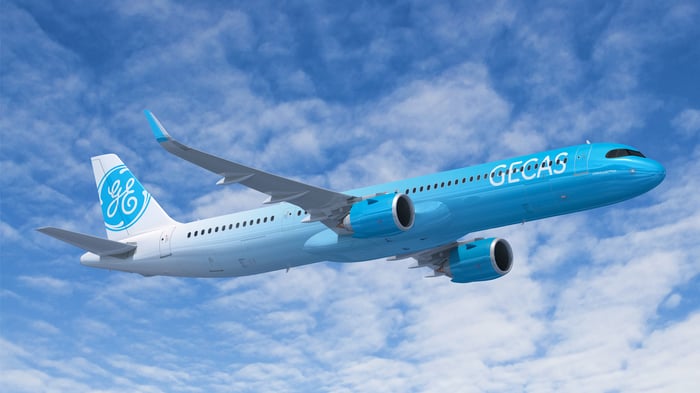On Wednesday, General Electric (GE 0.68%) took the next step in its dramatic transformation under CEO Larry Culp. The industrial titan finalized a deal to sell its GECAS aircraft-leasing business to top rival AerCap (AER -0.20%) as Culp seeks to simplify GE and refocus on its core industrial businesses.
While GE stock rose earlier this week following rumors of a potential deal with AerCap, the shares gave back those gains after the agreement was formally announced. Let's see how this move impacts the investment case for General Electric and AerCap.
Combining two aircraft-leasing giants
Under the deal announced this week, AerCap will pay approximately $31 billion for GECAS. That consists of $24 billion of cash, 1.1 billion shares of AerCap -- currently worth about $6 billion and equivalent to a 46% stake -- and an additional $1 billion that AerCap can pay in cash or notes at its option.
The sale price represents a modest discount to GECAS' book value. As a result, GE will record a $3 billion non-cash charge related to the sale. However, AerCap stock also trades at a discount to book value. GE is optimistic that the AerCap shares it receives will rise in value over the next few years as the global aviation industry recovers from the pandemic (and as AerCap wrings out merger synergies).
AerCap Price to Book Value, data by YCharts.
The AerCap-GECAS deal is particularly newsworthy because those companies are the two largest aircraft lessors in the world. Combining them will create an aircraft-leasing behemoth, so the transaction will likely be closely scrutinized by regulators.
On the one hand, there's been a big influx of new aircraft-leasing companies over the past decade and barriers to entry are low. These factors increase the probability that regulators will ultimately approve the AerCap-GECAS combination. But on the other hand, a merged AerCap and GECAS would have huge scale advantages, due to the breadth of its customer base and superior market intelligence. So antitrust hurdles do pose some risk.
GE Capital shrinks again
In recent years, investors have viewed GECAS as the one good asset remaining at General Electric's once-mighty finance arm. Prior to the pandemic, GECAS was earning annual operating profits of $1 billion or more.
However, airline bankruptcies and fleet restructurings have reduced GECAS' near-term earnings power. That seems to have encouraged GE's management to unload the business in order to simplify the conglomerate's operations and balance sheet.
As of the end of 2020, GE Capital had $103 billion of assets, excluding liquidity. GECAS made up over a third of that total ($35.9 billion), with GE's runoff insurance business accounting for most of the rest ($50.8 billion). With GECAS being sold and the insurance business positioned to shrink over time as legacy liabilities roll off, GE plans to simplify its financial reporting. Rather than treating GE Capital as a separate business unit with its own financial statements, GE Capital's results will be consolidated with the industrial businesses going forward.

Image source: GECAS.
General Electric will use the AerCap deal proceeds and excess cash to pay down about $30 billion of debt this year. Despite that debt reduction, GE's credit metrics could weaken modestly in the near term because GE Capital's debt will no longer be treated separately from the rest of the company's borrowings.
However, as GE's earnings power rebounds from recent lows and it pays down more debt, the company expects to reach its leverage target by 2023. By that point, General Electric will have a simplified business and balance sheet, which could help it earn a higher valuation from investors.
What about AerCap?
As for AerCap, the GECAS deal would make it the undisputed leader of the aircraft-leasing industry. Importantly, the purchase won't significantly impact its leverage, and AerCap expects to quickly return to its target debt-to-equity ratio of 2.7 times.
As noted above, the company's increased scale will be a significant competitive advantage. Additionally, merging with GECAS will reduce AerCap's customer concentration. That will make AerCap more creditworthy and could help it reduce its cost of capital.
Of course, any big merger entails some level of execution risk. But snapping up GECAS looks like a master stroke for AerCap CEO Aengus Kelly. The deal could potentially enhance AerCap's margins, driving strong earnings and cash flow growth. The company certainly faces stiff near-term headwinds due to the ongoing fallout of the pandemic, but it now looks well positioned to emerge from the crisis stronger than ever.






